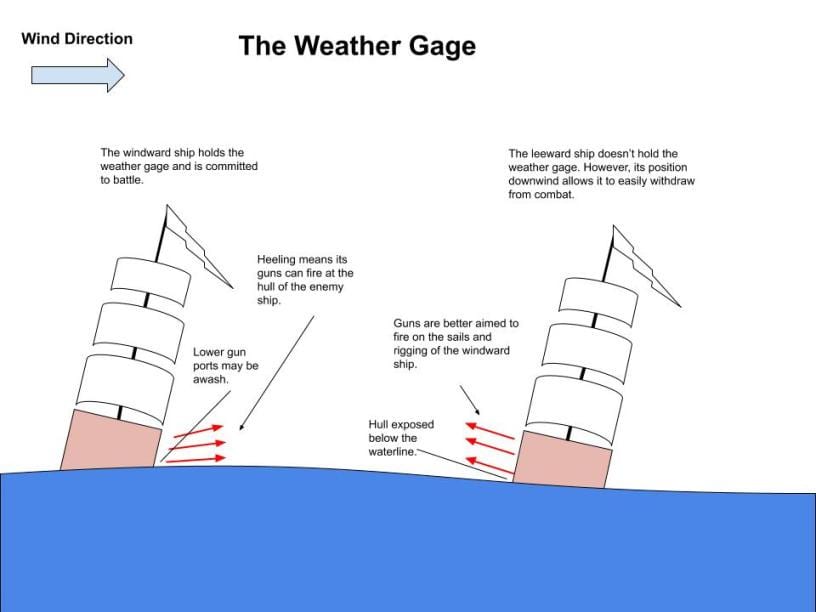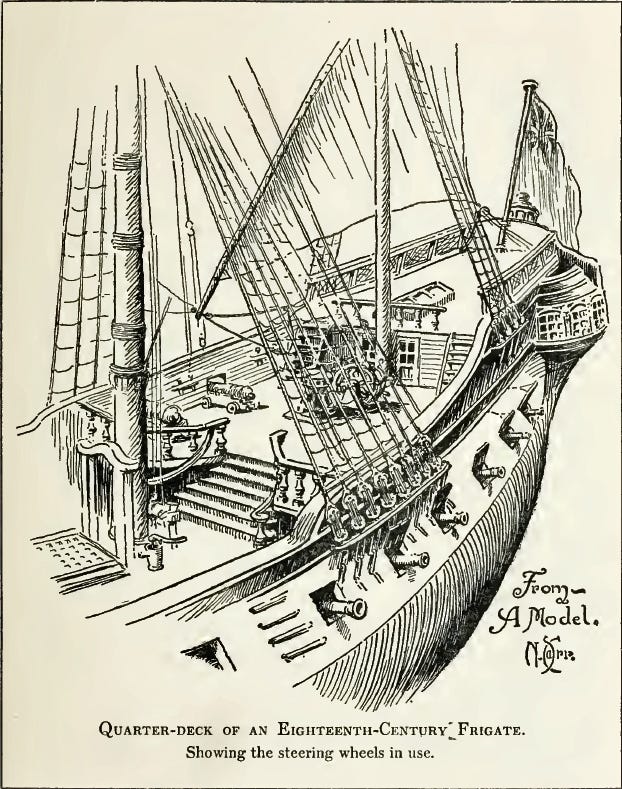The other day I discussed how high monitoring costs can explain the emergence of “aristocratic” systems of governance:
Aristocracy and Hostage Capital
Arjun Panickssery · Jan 8
There's a conventional narrative by which the pre-20th century aristocracy was the "old corruption" where civil and military positions were distributed inefficiently due to nepotism until the system was replaced by a professional civil service after more enlightened thinkers prevailed ...
An element of Douglas Allen’s argument that I didn’t expand on was the British Navy. He has a separate paper called “The British Navy Rules” that goes into more detail on why he thinks institutional incentives made them successful from 1670 and 1827 (i.e. for most of the age of fighting sail).
In the Seven Years’ War (1756–1763) the British had a 7-to-1 casualty difference in single-ship actions. During the French Revolutionary and Napoleonic Wars (1793–1815) the British had a 5-to-1 difference in captured/destroyed ships, and a 30-to-1 difference for ships of the line—the largest and most powerful ships. By the 1800s, contemporary accounts expected British ships to defeat opponents that had 50% greater gunpower and crew.
Allen cites evidence that this dominance wasn’t because of superior technology and that French ships were even marginally superior by the end of the Seven Years’ War. There wasn’t any substantial difference in gunnery or other equipment, and any new technology was quickly adopted by every navy.
Similar to the previous post, we see a dynamic where
- Monitoring is difficult: The sea was big and sometimes unmapped; communication was slow and limited.
- There was a large random element: Wind and storms are often plausible excuses for not achieving specific objectives.
Incentives were misaligned: Captains mostly profited from capturing wealthy merchant ships and receiving a share of the spoils. In battle, the captain’s position on the raised quarterdeck made him vulnerable (Nelson was killed by a French sniper at Trafalgar on the quarterdeck of the HMS Victory).
The last point was most important: all navies in this period had a problem of captains and admirals who would shirk from combat. At Trafalgar, a third of the French fleet didn’t engage in the battle at all. Ships could often blame wind or chance for their failure to engage the enemy. Consider the prelude to Trafalgar:
One of the more famous episodes of this sort was Nelson’s pursuit of the combined French and Spanish fleet. The combined fleet managed to escape a blockade of the French Mediterranean port of Toulon in March 1805. Nelson, thinking they were headed for Egypt, went East. On realizing his mistake, he crossed the Atlantic, searched the Caribbean, and then crossed back to Europe. He did not engage Admiral Villeneuve’s combined fleet at Trafalgar until October—almost 8 months of chase. Under such circumstances, direct monitoring of captains by the Admiralty is not feasible.
The British Navy was designed at multiple levels to encourage captains to fight:
Compensation: In addition to huge prizes—capturing a merchant vessel could make a captain wealthy for life—there was a wage system where officers were oversupplied and naval officers that weren’t at sea were kept at half pay. The unemployment pool that resulted from this efficiency wage made it easier to discipline officers by moving them back to the captains list. (Allen argues that a fixed-wage system would have led to adverse selection since captains on half pay weren’t permanently employees of the navy but would reject commissions that weren’t remunerative.)
Promotion: Unlike in the army, where commissions were purchased, promotion was guaranteed by seniority for anyone who reached the rank of captain. If a captain lived long enough without disgrace, he would eventually become an admiral of the fleet. A lieutenant assigned to a ship might never be promoted to captain, but also couldn’t be removed by the captain of his ship. Allen claims that this relationship was important because lieutenants were required to keep detailed logs of the ship’s activities that could be cross-referenced with the logs of the ship’s master (the highest-ranking non-commissioned officer, who also couldn’t be removed by the captain). These logs would serve a “watchdog” role that monitored a captain’s performance.
Battle Tactics: Here Allen brings up two points. First was the “line of battle” formation in which ships literally lined up to match with opponents. While this formation had the weird property that battle could only easily take place if the enemy also formed a line of battle, it had the advantage of making it easy for the admiral—usually in the center of the line—to monitor the conduct of other captains. The second rule was to “capture the weather gauge,” i.e. to stay upwind of the enemy. This was technically inferior since the lower gun ports could often be underwater (see image) and because the downwind (leeward) position made it easier to flee if needed. But the advantage of taking the weather gauge was that captains of square-rigged ships from that period typically couldn’t sail except toward the enemy.

The strategy of taking the weather gauge in particular was not adopted by other navies and the French military theorists deliberately took the opposite strategy of staying in the downward position and shooting into the masts and rigging of enemy ships. But this made it easier for captains to shirk, as in the Trafalgar example above.
The Articles of War mandated engagement with any enemy ship roughly the same size as one’s own. It was taken seriously and often mandated the death penalty (emphasis mine):
10. Every flag officer, captain and commander in the fleet, who, upon signal or order of fight, or sight of any ship or ships which it may be his duty to engage, or who, upon likelihood of engagement, shall not make the necessary preparations for fight, and shall not in his own person, and according to his place, encourage the inferior officers and men to fight courageously, shall suffer death, or such other punishment, as from the nature and degree of the offence a court martial shall deem him to deserve; and if any person in the fleet shall treacherously or cowardly yield or cry for quarter, every person so offending, and being convicted thereof by the sentence of a court martial, shall suffer death.
…
12. Every person in the fleet, who through cowardice, negligence, or disaffection, shall in time of action withdraw or keep back, or not come into the fight or engagement, or shall not do his utmost to take or destroy every ship which it shall be his duty to engage, and to assist and relieve all and every of His Majesty's ships, or those of his allies, which it shall be his duty to assist and relieve, every such person so offending, and being convicted thereof by the sentence of a court martial, shall suffer death.
The most famous application of these laws was at the start of the Seven Years’ War where Admiral Byng returned to England from the Balearic Islands in the Mediterranean rather than seek local repairs after French ships damaged the sails of his fleet. (Note that this description of events from Allen contradicts Byng’s Wikipedia page, which claims that Byng departed to Gibraltar and then was relieved by an incoming ship from England, though the relevant sections say “citation needed”). Byng was court-martialed and sentenced to death for failing to “do his utmost” and was shot after the king declined a request for clemency from the First Lord of the Admiralty and the Prime Minister.
The introduction of steam ships in the 19th century ended most of these practices, including the harsh Articles of War, which were replaced by the Naval Discipline Acts of the 1860s. In the same decade, the discontinuous promotion system involving lieutenants was phased out. Again we see the relevance of monitoring ability to institutional design.


I did not realize the death penalty for captains failing to engage was the proper context for Horatio Nelson's immortal signal " England expects that every man will do his duty"
I don't think this is accurate, famously Nelson originally wanted the signal to read "England confides [is confident] that every man will do his duty" - a much more motivating message that says to all hands that Nelson (and the Nation) has every confidence in them.
His flag steward pointed out that they didn't have a shorthand signal for "confides", but did have one for "expects"; which would simplify the flag signal significantly. Rather than having the flag signal laboriously spell out every letter of C-O-N-F-I-D-E-S, Nelson instead ran up "Expects".